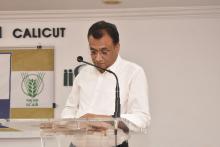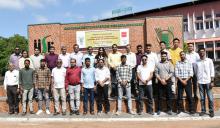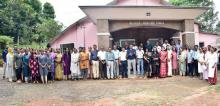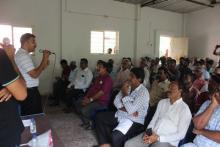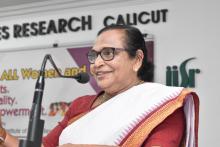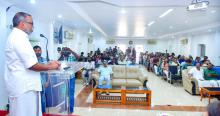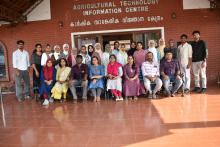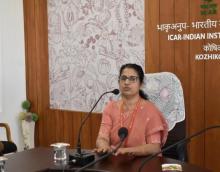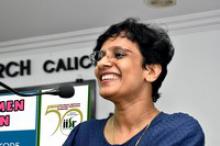SAARC Regional Expert Consultation Meeting on Technology Sharing of Spice crops being inaugurated by Dr. P Rajendran, Ho’ble Vice Chancellor, Kerala Agricultural University.
The Regional Expert Consultation Meeting on Technology Sharing of Spice Crops in SAARC Countries was inaugurated by Dr P Rajendran, Hon’ble Vice Chancellor of Kerala Agricultural University at ICAR-Indian Institute of Spices Research, Kozhikode. In his inaugural speech he highlighted the importance of Spices Sector in India which contributes 6% of the GDP and reiterated the creation of a spice genetic pool for sharing among the SAARC countries. He further emphasised the importance of creation of seed bank and provision for exchange of planting material and corpus fund for trade issues among SAARC countries.
In his Presidential Address, Dr Homey Cheriyan, Director, Directorate of Arecanut and Spices Development, Kozhikode stressed that ‘we are witnessing an increase in productivity of spices due to improved varieties and technological interventions, though there is an urgent need for new policy initiatives to confront the challenges facing spice production’.
Dr Pradyumna Raj Pandey, Senior Program Specialist (Crops), SAARC Agriculture Centre, Dhaka, Bangladesh explained the concept, purpose and objectives of the meeting, while Dr K Nirmal Babu, Director, ICAR-IISR, Kozhikode welcomed the gathering and underlined the importance of knowledge sharing on spices among the SAARC members.
The Technology Exhibition Pavilion was inaugurated by Smt. Geetha, Principal Agricultural Officer, Department of Agriculture, Government of Kerala
The three day meeting is being attended by scientists and policy makers from six member countries of SAARC (Afghanistan, Bangladesh, Sri Lanka, Bhutan, Nepal, India).
The second day of the meeting involved country presentations from India, Nepal and Sri Lanka followed by a brainstorming session involving experts from Afghanistan, Sri Lanka, Bangladesh, Nepal, Bhutan and India on Policy and Technological Interventions for Spices Value Chain Development in South Asia. The following were the major recommendations:
• A unified stand on food safety and sustainability to be taken up by member countries through frequent dialogues and interaction.
• A knowledge portal to be set up for information and knowledge management pertaining to spices
• Integration and harmonization of GAPs and trade policies among member countries
• A spice task force on technology sharing and sorting out trade related issues may be set up.
• A technology hub needs to be created for creating awareness and sharing of technologies including varieties among member countries.
• Partnerships with industry in contract farming, value addition and processing to be promoted.
• Harmonization of standard operating procedures in quality evaluation and processing.
• A Centre of Excellence in Spices may be established for human resource development and skill enhancement.
• Institute scholarships for post graduate and doctoral studies in spices.
• Country specific researchable issues in spices need to be identified and prioritized.
• Create a research platform to address common problems in member countries and facilitate visit of experts.
• Pilot studies on feasibility of introducing newer spices to member countries may be undertaken.
• Immediate efforts should be taken to identify and document the intrinsic qualities of ethnic spice varieties to fetch premium price to growers.
• New research initiatives to be undertaken to establish the superiority of natural spices over synthetic ones.
• An integrated research and development project may be prepared and submitted for external funding.
The brainstorming session was chaired by Dr. Homey Cheriyan, Director, Directorate of Arecanut and Spices Development.


